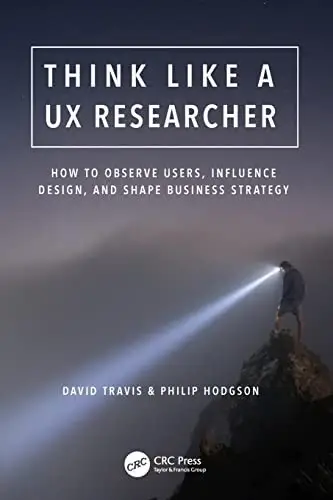
Essential Review: Think Like a UX Researcher

Think Like a UX Researcher is a standout guide for anyone aiming to go beyond surface-level design thinking and truly grasp the mindset that underpins effective UX research. Written by industry veterans David Travis and Philip Hodgson, the book combines practical wisdom, clear explanations, and decades of real-world experience to offer an accessible yet comprehensive resource.
What makes this book unique is its structured, no-fluff approach. Rather than just presenting tools or isolated methods, it challenges readers to adopt the critical thinking habits of successful UX researchers—questioning assumptions, interpreting findings with clarity, and knowing when and how to act on insights. The authors cover both generative and evaluative research, offering step-by-step guidance on everything from writing research plans to communicating results with impact.
Overview and Key Value Proposition
"Think Like a UX Researcher" by David Travis and Philip Hodgson stands out in the crowded field of UX literature by focusing on something more fundamental than methodologies—the researcher's mindset. While many UX books concentrate on the tactical aspects of conducting research, this work elevates the discussion to the strategic thinking that informs which research methods to use and why.
What Makes This Book Different
The most compelling aspect of this book is its emphasis on developing critical thinking skills that help UX professionals make informed decisions throughout the research process. Rather than simply cataloging research techniques, Travis and Hodgson teach readers how to:
Challenge assumptions that might otherwise lead to flawed research designs
Determine which research questions will yield the most valuable insights
Adapt methodologies to fit constraints while maintaining research integrity
Translate research findings into actionable recommendations for product teams
Each chapter is framed with provocative questions and includes practical exercises, making it perfect for self-study or team development. It's particularly useful for professionals working in agile environments who need to integrate research quickly and effectively into product cycles .
Practical Application Focus
"Think Like a UX Researcher" serves multiple audiences effectively. For beginners: The book provides a robust foundation in research principles that will help newcomers avoid common pitfalls and develop good habits from the start.
For experienced practitioners: It offers frameworks for refining their approach and addressing more complex research challenges.
For UX professionals working in cross-functional teams: It includes valuable guidance on advocating for research and integrating findings into the product development process
Audience and Accessibility
"Think Like a UX Researcher" serves multiple audiences effectively: For beginners: The book provides a robust foundation in research principles that will help newcomers avoid common pitfalls and develop good habits from the start For experienced practitioners: It offers frameworks for refining their approach and addressing more complex research challenges For UX professionals working in cross-functional teams: It includes valuable guidance on advocating for research and integrating findings into the product development process
Final Assessment
Based on the information provided, "Think Like a UX Researcher" appears to be an essential addition to any UX professional's library. Its focus on the thinking process behind effective research, rather than just the mechanics of conducting studies, fills an important gap in UX literature. The practical orientation makes it particularly valuable for those working in fast-paced environments where research must deliver clear value while remaining efficient. For anyone looking to elevate their UX research practice from merely following procedures to making strategic research decisions, this book seems to offer exactly the guidance needed to make that transition.
In essence, this book doesn't just tell you what UX researchers do—it helps you think like one, making it an invaluable resource for both emerging and experienced professionals who want to elevate their research practice.